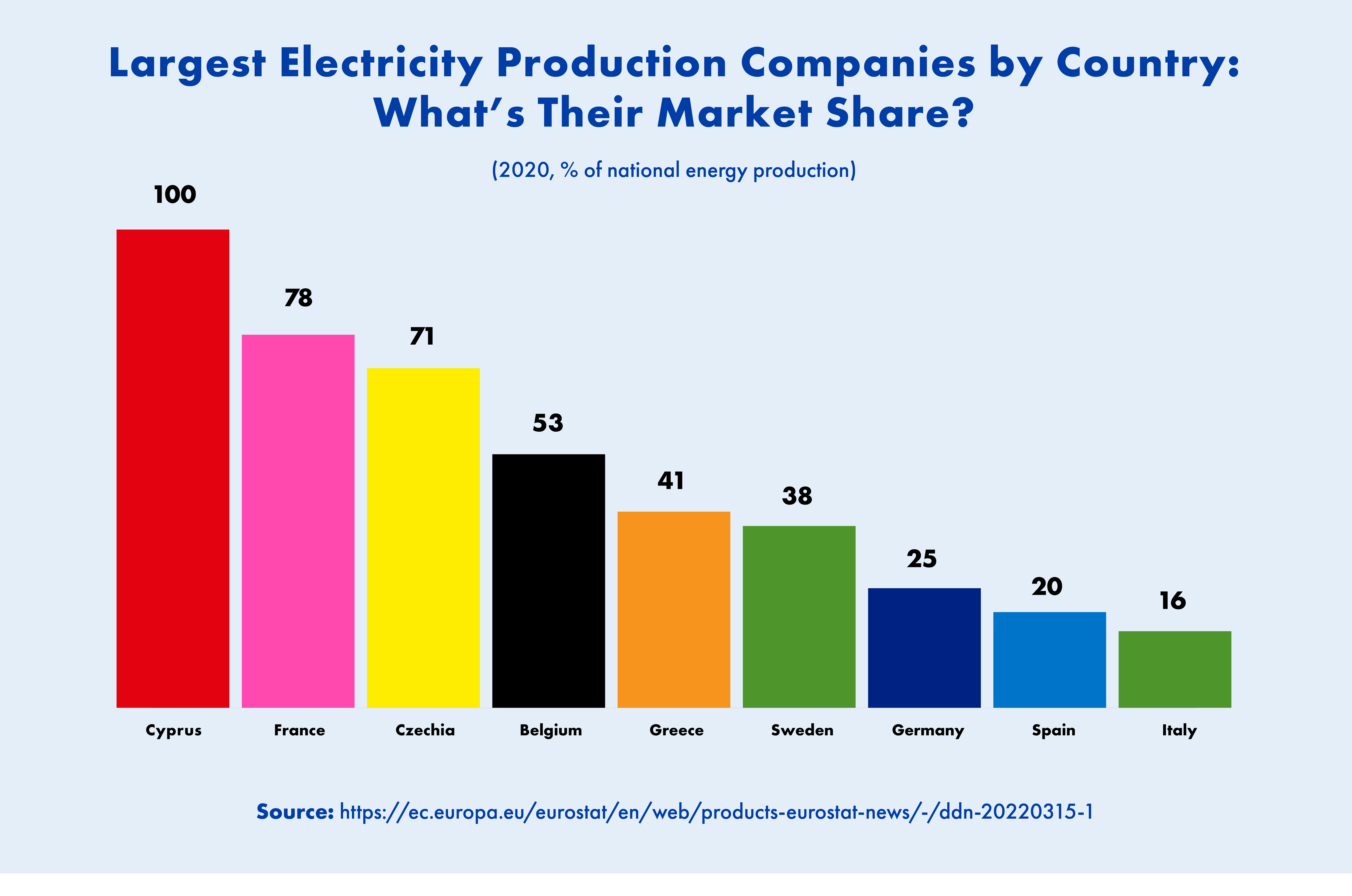Issue #79
Guten Morgen!
This week we’re getting quite digital! The EU (together with the US in one case) has moved the needle on two very crucial aspects of digital policy: the Digital Markets Act and a replacement for the Privacy Shield. Then, take a peek at Jonny’s House’s View to reflect upon what is and isn’t needed from onlookers during this terrible war. Finally, Christian’s WOOM is a pleasure for anyone with a keen interest in possible lessons from cosmology for international relations and polisci. Have a wonderful start to your weekend and happy reading!


Anna Christian
FIRST, SOME SOLID INTEL:
Sending Echoes Through the Digital World: Agreement on Digital Markets Act (DMA) Reached
Roughly a year after the first draft was released, the European Institutions have reached an agreement on a major piece of digital regulation: the DMA. In a [Kraut]shell (sorry, I had to), the DMA seeks to define clear rules and obligations for large online platforms. For anyone wondering why they should care, I’ll go out on a limb and say this regulation is on the same level of impact as the General Data Protection Regulation and will change global digital competition models for good.
Much of the heated arguments between the EU Parliament and -Council (Member State governments) focused on seemingly the most basic part of the regulation: who is considered a “gatekeeper?” Simple question, complicated answer. In its final version, the agreement has a slight geopolitical dimension to it. De-facto, only large foreign (cough cough GAFAM) companies will be affected (in the near future at least), and the chances for major European platforms like Booking.com or Zalando to reach the threshold are slim. Beyond gatekeeper-classification, the DMA comes with a laundry list of obligations for large players. First, the EU Parliament was successful in including interoperability requirements for messaging services, so hopefully I can delete some of the 8 different messaging apps I have on my phone. Platform vendors must have access to their marketing or advertising performance data, and app developers must be able to access supplementary functions of smartphones (like the NFC chip). Furthermore, self-preferencing of own products and services will no longer be permitted for gatekeepers, and certain software applications can no longer be pre-installed by default. Fines are quite hefty too, so be sure to let us know if you want more information on the intricate details.
Open the (Data) Floodgates!
This week, President Biden visited Brussels to meet with NATO- and EU Leaders, and it was very refreshing to hear the term “us” being used again to describe the US and Europe. Obviously, the main topic of conversation was aligning strategies against Russia, but another impactful topic unexpectedly made its way onto the agenda.
We can’t but help hide our excitement because a provisional agreement has been reached on flow of personal data between the EU and the US. We’re still months away from a final deal, and the details are few, but here’s what we know so far: There’s a planned “two-tier redress system” to investigate complaints by Europeans about access to data by US intelligence authorities. This also includes a Data Protection Review Court. Here are some of the murmurs in and around Brussels on the topic: For Commission President Ursula von der Leyen, it was all about the morals and principles, while Joe Biden made no secret of the dollar signs in his eyes, stating the agreement would “once again authorize transatlantic data flows that help facilitate $7.1 trillion in economic relationships.“ The business community also rejoiced at the news, stating how critical this agreement is for spurring innovation and growth. Meanwhile, privacy activists will be watching like hawks and a new lawsuit is all but certain. Therefore, lawmakers must do their homework and leave no question unanswered. Once more details emerge, we’ll be sure to update you.
Finally, Some Relief
€15 billion is the sum of all sums. It is the amount it will allegedly cost to apply all measures the Federal Government has decided on to relieve the German citizens. The increasing prices on nearly all forms of energy due to Putin’s War are hitting Germans hard in times where inflation is already causing insecurity for many people. Here’s a short overview of what the German government is doing to tackle this problem.
The most prominent measure is called “energy money” and comprises a one-time paycheck bonus over €300 for all German employees. They are taxable, meaning low-paid workers profit more than wealthy people do. Furthermore, a bonus of €100 on child allowance is granted to relieve families. To reduce gasoline prices, the German government decided to decrease energy taxes on the minimal level mandated by the EU for a period of three months. The possibility to buy a monthly pass for public transport in any city for only €9 shall be a motivation for citizens to leave the car at home and take the bus or train instead.
The measures have caused mixed feelings among economists. Traditionally more conservative economists criticize the broad range of the measures, arguing that the government’s buckshot approach is not well-suited to help unerringly. More left economists, meanwhile, are not thrilled that some measures benefit wealthy people the same as low-income individuals. All in all, we can say that criticism from both sides probably means the result is part of a compromise which is face-saving for everyone. Whether the measures are effective is to be seen in the coming weeks. We’ll keep you posted.
TAKE A BREAK, GIVE YOUR EYES A REST.

Source: Eurostat
THE HOUSE’S VIEW
Drifting Off – Realpolitik and Complacency
What are appropriate responses to the aggressive war that Russia has unleashed against Ukraine? What, above all, are appropriate responses to the humanitarian crisis that the Ukrainian people are suffering? Millions of people are fleeing, losing only their homes if they are “lucky,” or also their loved ones if they are unlucky. From afar, we are witnessing the greatest suffering that has taken place on the European continent for many years. And we are struggling to find reactions, words and measures to provide some relief from the pain, or at least not be inactive. How are German politicians, civil society and the supposed opinion leaders of this country positioning themselves? An attempt at classification.
The Measures No One Asked for
Times of crisis, especially in Germany, are times when old ideas experience a renaissance. Ideas that have often been rejected and that no one asked for. This week, for example, some politicians and environmental activists once again called for a speed limit on German highways. This time with the reasoning that potential savings in gasoline would ensure that less money is flushed into the Russian war chest and Germans’ wallets would be relieved during these times of high fuel prices. All they would have to do is drive a little slower. Meanwhile, rockets are hitting a theater in Mariupol, killing about 300 people, according to Ukrainian sources.
The Thoughts That Don’t Help Now
The massive expansion of renewable energy is not just the only way to climate neutrality, but also the only way out of dependence on authoritarian states that sell us gas, oil or coal. There is no doubt about that. Recently, Luisa Neubauer, who is more or less the German face of the climate movement “Fridays for Future,” explained in a well-known talk show that there wouldn’t have to be a catastrophe in Ukraine now if Germany had switched entirely to renewable energies. Meanwhile, according to Ukrainian reports, several people were killed in rocket attacks on a medical center in Kharkiv.
In Search for Morality
One gets the impression many (especially political) opinion leaders try to regain their morality. A problem that large parts of the “normal” civilian population do not have. They donate, send clothes and food, take in Ukrainian refugees at their homes. They are certainly not solving a global crisis, but they are helping according to their means. In the meantime, commentators in major German newspapers are wondering whether it is regrettable that the figure of the “macho” is experiencing an unpleasant renaissance, reflected by the personalities of the Klitschko brothers or President Selensky. Meanwhile, everyone knows where missiles are hitting.
A Ray of Hope: Realpolitik
You might ask now: What is the German government actually doing? After last week’s image disaster, when MPs went straight back to business as usual following a moving speech by President Selenskyj that was transmitted directly to parliament via video link, Germany’s top politicians quickly regained their composure. While Chancellor Scholz (SPD) met with the heads of state of NATO, the EU and G7 countries on Thursday and Friday, perhaps the most important appearance this week was with Vice Chancellor and Economics Minister Robert Habeck (Greens). Habeck flew to Qatar to explore new energy partnerships that could provide short-term relief in energy dependency. Admittedly, the effectiveness of this venture is still much debated, including doubts about the emirate’s supply capacities. Still, one has to imagine Habeck, until recently head of the Green Party, an anti-authoritarian ecological party, shaking hands with autocrats in hopes of buying fossil fuels from them. Of course, it is mainly in Germany’s interest to be less dependent on Russian energy imports, but it is also in Ukraine’s interest.
The House’s View
Morality, and this is almost a truism, is something you have to be able to afford. This was demonstrated by Robert Habeck, who certainly did not abandon his principles lightly, but who was prepared to take on any conceivable criticism from within his own ranks in order to make progress. No NATO state can intervene directly in the war in Ukraine. But the efforts of the German, French or US government and also the many helping citizens in countries like Poland or the Czech Republic show that these days the moral self-aggrandizement does not bring any progress. We can only fail with questions about the failures or ideas that have long since become obsolete. The time to come to terms with the past has not yet begun, the crisis is still in full swing and currently everyone would do well to come to this realization. It may not save the Ukrainian people, but it is the least we can do for them.
LONG STORY SHORT:
- Mandatory Vaccination? Not if the Trees Can Help It: This week Germany was in a Twitter-uproar as the strangest reason was given for why a general vaccine mandate would not be possible: the health insurances said they don’t have enough paper to send German residents a letter. You can’t make this s*** up.
- Un-Taxonomize that Energy! A few weeks ago, the European Commission did France a favor by classifying nuclear energy as “green” for the sake of subsidies. However, the German government is not happy about it, and made it very clear in an answer to a minor inquiry from the Left Party. They’ve even already launched a formal complaint to the EU.
- Stop the Hack: This week, the EU Commission presented a new set of rules to protect all EU institutions, bodies, offices and agencies from cyberattacks. The question on everyone’s minds though: is it too little too late?
WHAT’S ON OUR MINDS
Cosmological constants
By now, we all are surprised by how the Ukraine-Russian conflict is playing out; Biden is, Scholz is, Macron is, Putin is and maybe even Jens Stoltenberg is. Western leaders and certainly Berlin miscalculated the equation of the post-cold-war era. Wrong assumptions, such as the degree to which governments comply with international treaties or the logic of peace for trade, led to faulty results on our side.

The same applies for the Russian side. The assumption that the West would be paralyzed in awe once Ukraine would be overrun by an overwhelmingly strong Russian army? Well, double-wrong. In short, when asked by “January-Putin” whether he should or shouldn’t invade Ukraine, the time-travelling “March-Putin” would surely go back and say:

It struck me a few days ago after bumping into a former military Commander. He predicted in February, that Ukraine was basically lost the moment Russian forces crossed Ukrainian borders. When asked, if he would still see it that way last week, he drew my attention to the conquered territory and replied, “so far, from a military point of view, yes, it is a substantial success for Russia.”

That felt off. Then it reminded me of one story about the work of Albert Einstein, (who was born in the hometown of my youth Ulm❤️). His equation to prove a static universe – which was the accepted view on the nature of the universe at that time – could only deliver the wished-for result, when a “cosmological constant” was added. When Hubble confirmed the expanse of the universe, Einstein abandoned the constant.*

Maybe something similar is happening in our case. Our security strategy is still based on a calculation that counts on the awareness, or say, the “sobering effects” (Waltz) of the obvious costs that all leaders know a war would entail. But what if the nature of the international order, based on the logic of a sustainable balance between nations, does not reflect the truth? Well, the equation still works, if the constant of securing nation states is added to all deriving strategies, no surprises here so far. But, as our static view of a world of nations is expanding into a new reality, the old constant, to primarily think in national interests, slowly but surely approaches zero.
*Btw.: Happy Birthday to Nobel prize winning physicist Carl Edwin Wieman, who successfully worked with Einstein’s theories in other fields.


